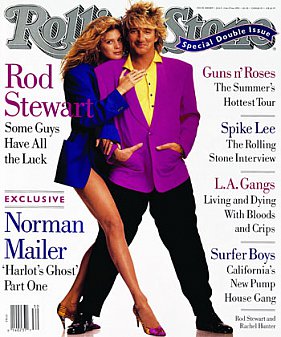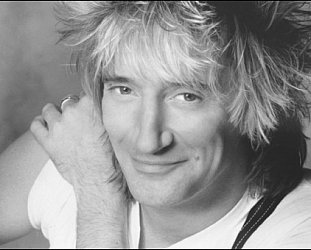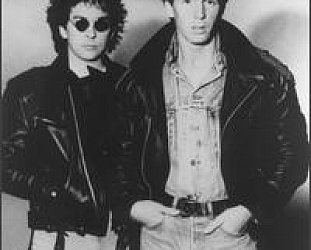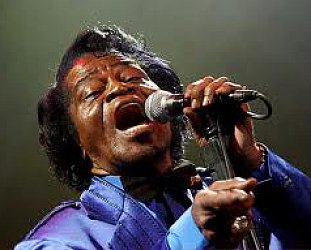Graham Reid | | 10 min read

In typically witty cover notes to the six-album Storyteller anthology released two years ago to celebrate 25 years in music, Rod Stewart appended something interesting after his signature...”Stewart’s the name, singing’s the game.”
And that’s worth remembering.
Fashions may change (and with Stewart every debauched or debonair picture tells a story), the ex-wives and lovers fade away but, as critic Robert Palmer observed: “The nature of Stewart’s work keeps getting overshadowed by that larger-than-life public persona. Lurking behind the fun-loving, boys-night-out facade is an artist who is both gifted and complex.”
And in for the long haul. This is a man who had his first “best of’ collection released 15 years ago and only last year sprung a handful of hits from his Vagabond Heart album.
A fortnight ago, when Billboard magazine ran the top 10 concert grosses for January, four of them were Stewart’s. Twenty-five thousand people don’t turn up to the San Diego Sports Arena to see a celebrity; they go to hear songs which have written themselves into their autobiographies.
And this week sitting by the pool in the quiet, bare opulence of Waimanu in Auckland - the exclusive private home rented out to rock stars and travelling royals Stewart seems delighted that attention has been focused back on his music.
In fact, he look pretty happy all round. Slightly jowly, sure, and with that expanded collar size which a lifetime of singing soul brings, but he likes his size and is unselfconsciously relaxed with his polka-dot shirt spilling wide to reveal a sun-ripened chest. He doesn’t do interviews much these days (“but I was bored,” he laughs) and shifts the conversation to his beloved soccer at any opportunity.
But singing’s the game.
Since Vagabond Heart came out the music has been getting more attention again and some amazing reviews – “even in Europe and me own country,” he grins. “The NME gave our show a good review, which is the first time they’ve said anything good about me for 20 years...[expletive deleted] amazing.”
Stewart readily blames himself for the press being more taken by his celebrity status than his songs. He admits that in the early 70s he worked on his image and believed everything he read about himself. It also took a long time to get over the critical (but notably not public) backlash over Do You Think I’m Sexy? The man with the heart full of Celtic soul had gone disco and few would let him forget it.
“Every show critics say, ‘Why does he still do that song?’ I play it because people love it and I can see the expressions on their faces the minute they hear the intro. But I’d hate to think it was the only hit I’d ever had. It’s nice to have so many current things happen. I’d hate to be a nostalgia act.”
For a man who has most often laughter longest and loudest about himself, Stewart still keeps it all in perspective. Say he’s looking good, given his age and the debilitating excesses of his lifestyle some years ago, and he hoots with laughter again.
“The grandfather of rock’n’roll, I love it. It means I’ve survived and don’t have much to prove anymore...but of course I have. It’s nice to keep current and I’d hate to do something like that last Who tour, where they were pumping out hits from 20 years previous. When the well dries up for me I’ll disappear...but last year was the best I ever had.”
Put that down to the Storyteller collection which forced a critical reassessment of his career and showed how few mistakes he had made over that long haul. Put it down also to Vagabond Heart which saw him writing songs like the ballad If Only, which stands the equal of anything in his career. Put it down to his new-found contentment which he will offer up candidly at any opportunity. “The wife” [Rachel Hunter] is seldom far from his thoughts.
And that candour – as much as his songs – has been an endearing part of Rod Stewart. When he came to compile Storyteller he tossed it all in, good, extremely bad and indifferent (“you’ve got to show the stains as well as when it shines”). It also let him reflect on a career and conclude he was writing and singing better now than ever.
“But the one thing lacking now is the way we used to throw those early albums together. Nothing was planned. Every Picture Tells a Story [from 1971] took three weeks to record and I wish I could recapture that.
“It was the attitude we had back then, and I didn’t have any success behind me so there was no caution. You had nothing to lose so you could get drunk and make an album...but you can’t be sweet sixteen all your life.”
But there’s nothing to prove now either, so why not go in with that attitude and knock out an album with no caution?
“If I didn’t have to write the songs I could do it again...and the person I’d do it with now is Jeff Beck. He and I made some landmark albums. Jeff just works when he needs to now...but together he and I were magical.
“You know, I’m very good mates with all the people I’ve been in bands with and we keep in touch. I must have had about 30 at our wedding.
“But,” he say almost conspiratorially, “this one is an all-American band apart from the drummer, so they’re all terribly, terribly professional. They don’t drink - and sound great. But it’s not the same as having a bunch of drunken Brits around you...they were great times.”
It sometimes seems almost too easy to turn Stewart nostalgic and reflective. Mention the CD reissue of the Alexis Korner band from the early 60s which includes his old mate Long John Baldry, and Stewart digresses effortlessly into talking about Baldry, now living in Canada and working the folk circuit. He chats about the old Chris Barber jazz and blues bands and how much the Stones, the Yardbirds and himself owed to those long-forgotten groups.
But the soul music he still loves and listens to has all gone. His only heroes are dead, he says wistfully, and he can’t think of any great black singers he admires today, “except Bobby Womack, he always asks me to sing on his records but there are some contractual problems or something, you know...but we’ll get it sorted out.
Teddy Prendergrass is another good one, he says, but he was the last. “But I’m not sad that soul will never be the same. Things have to progress.”
He talks affectionately and with visible enthusiasm about seeing Otis Redding (“but all those guys only ever did 15 minutes in some soul revue,” he laughs, noting he’s up there for about two hours at least) and says that was when the seed was planted with him. Then he corrects himself with another grin.
“No, man...the seed was planted when my brother took me to see Bill Haley and the Comets in Kilburn. The balcony was goin’ up’n’down...it was great. I was, let’s see I was born in 1945 so I must have been about 11 or 12. I remember that to this day. That’s what this thing is all about.”
To see Stewart obviously itching to get back on stage is a rare pleasure. He’s been in town 10 days and ready to do a show. The band has arrived, he’s hot to rehearse and put together a set, the country has been good to him and he’s been relaxing around the pool with the sound system turned up loud. It’s no surprise to hear what he has been listening to. On the table is an Allen Toussaint compilation beside the iced water he sips constantly.
“We’ve been into some great old Slim Harpo album that’s out on CD and today we’ve been listening to that box set of Stax singles...and God, there’s some [expletive deleted] rubbish on that.
“You know, I listen to that stuff a lot now to be reminded of how good it was. It makes me love the business again.
“I recently went to this play Buddy, about Buddy Holly, and I just fell in love with music again. When you’ve been on the road for nine months you get a bit jaded and it’s hard to get up there every night and be enthusiastic about it all over again. You manage to do it – but every now and again I have to put that old music on to remind me why I love it so much and it’s why I got involved in this thing. These were the people who started it for me.”
If, as he admits, he started off trying to sound like Sam Cooke and Otis Redding but “thankfully now I sound like Rod Stewart,” he is more reluctant to look at his own legacy in music.
He skirts the question, digresses into how much he loves soccer and has more passion for it now than he ever did, laughs when he realises what he is doing and then eventually comes back to the question self-consciously.
“It does seem like every other singer is trying to sound like me – there’s a lot of that going on lately.”
And without mentioning all the sub-Faces clothes trotting the American stadium circuit, it is easy to give Stewart a nudge. Like?
“Oh, I couldn’t say that. That would be terrible [pause]. Climie Fisher for one,” he laughs, and then quickly avoids a rollcall by hailing the current soul revival which he credits to The Commitments movie.
It pleases him his passion is coming back and not just because he does a three-song soul section in the middle of his lengthy set. Two hours is a long time for a forty-something singer to take centre-stage, particularly one who insists he doesn’t do physical exercise – hours of soccer excepted. “The stage is where I work out.”
“I’m astonished by the shortness of some shows,” he says when told Nirvana – whose success he is suspicious of – checked out after little more than an hour.
“Well, we used to do that in the Faces I suppose because we only had the one album. Woody [guitarist for Ron Wood, now in the Stones] would take four solos, the pianist would take four and I would get out the back and have a drink and a meal! But we have to make the show last. No trouble now, of course. We do two hours easy, right up to curfew.
“But its hard picking a set to play because I don’t know what has been a hit down here. Warners have suggested 25 songs which have been popular on radio here for 20 years.
“It’s like picking a football team for just one game, “he says, sliding back into an analogy which comes so easily for him.
With Vagabond Heart last year the album count for Stewart now reaches 18, and while he acknowledges periods of bad work (“the early 80s weren’t good, but it’s all mountains and valleys, isn’t it?”) he could easily fill a show with his classic material.
“Maybe it’s laziness now but in the old days I think used to write songs myself. I’m much more an open book now. I was always shy about writing songs with other people and used to keep it within the band. If I do an album with Jeff [Beck] I’m going to branch out and write with others outside the group.
“But I think I took my song writing on guitar as far as I could because I only know about six chords. I’m still good on the melodies though.
“Some of the best love songs I’ve ever written have been when I’ve not been in love or had someone serious in my life. But you need to know both ends of the spectrum – dead [expletive deleted] miserable and know how happy you can be.
“I’m not a disciplined writer either. In fact, I don’t like writing songs but the feeling you get when you hear them on radio is still tremendous. The only thing is they don’t belong to you anymore. It’s strange. One minute it was there and you were writing lyrics on a pad – then there it is on radio. It’s like you lost your baby and it now belongs to the public.”
Having been public property himself for so long has obviously cost Stewart. His honesty has frequently been misrepresented, his taste in women deemed more newsworthy than a lifetime of achievements. He has rarely responded but on the cover of the last album noted “many foolish and hurtful things have been written about myself in the press over the years, most of which have been severely embroidered half-truths, and in some cases, out-and-out lies. I’m not complaining, just stating a fact.”
So it is Rod Stewart Celebrity, not Rod Stewart Singer, who has been on public display in the past two decades...which perhaps accounts of his current buoyant mood. He relaxes in New Zealand and enjoys just being “the Duke of Edinburgh” behind “the wife.”
Round the pool by day, soccer at 5pm, dinner with friends...it is one of the longest breaks he’s had for a while. And he’s loving it.
The grandfather of rock? It’s a long way from the old days for this man who admits he can’t even remember the time he last played here. Bit of a blur apparently. As he says “you can’t be sweet sixteen forever.”
“Oh, I can still go mad sometimes – like I’ll go mad after the show on Saturday because I’ve got two days off after that. I have a glass of Mateus for my throat before I go on, a glass half-way through...and five bottles afterwards. But if I drink too much now I forget the (expletive) words!
“I remember the days when I’d walk on with half a bottle of rum inside me. And I don’t regret any of that. You just progress and grow up. It’s so interesting for me now to be this age, still selling records and cramming the people in.
“I suppose nostalgia has a lot to do with why people come...they want to hear a particular song. When I went to see Otis Redding before I came into this business I knew the songs I wanted to hear too. But I’ve still got a current career and I don’t think I embarrass myself. I’m enjoying myself up there.”
Older, heavier around the jowls, maybe even slower too. But still doing it.
Stewart’s the name, singing’s the game.







post a comment